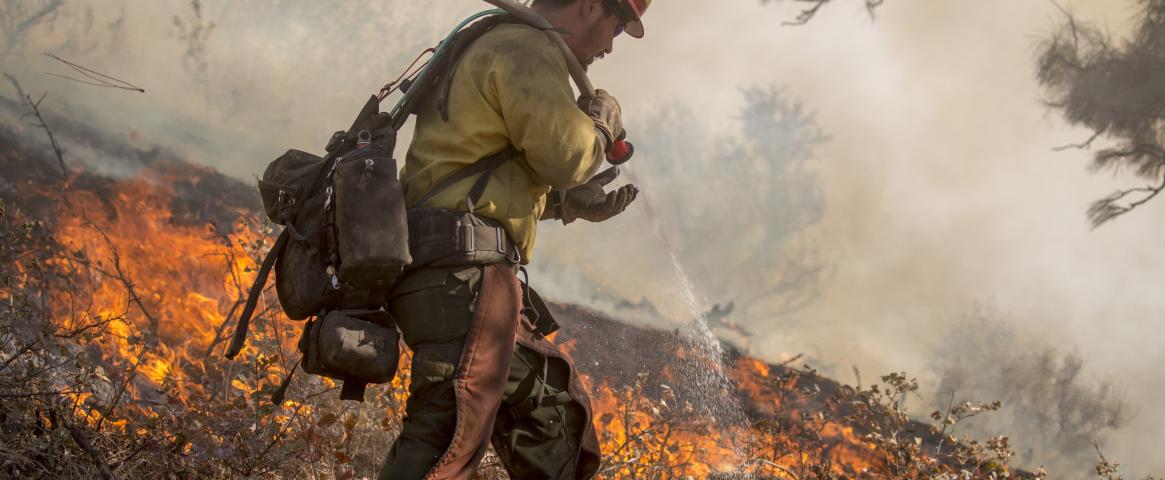By Elise Cutts. Mentored and edited by Julia Rosen.
America’s climate is changing. To prepare for the future, state lawmakers need accurate information about climate impacts, but political attitudes can make it hard to collect and share that information effectively in conservative areas. The trick, say experts working in Indiana, Idaho, and Missouri, is to start by listening to local communities.
“Being genuine and really wanting to hear what other people think and listening to them is so important," said Rachel Owen, former executive director of the Missouri Science Policy Initiative, which provides science-based information to Missouri policymakers who request them. “People will see right through efforts that don’t have that sincere motivation behind them.”
In a February 19 virtual workshop at the American Association for the Advancement of Science annual meeting, Owen and other science and policy experts shared their experience preparing reports on how climate change will affect “non-coastal states” where conservative politics can complicate such efforts. They emphasized that engaging with stakeholders was vital.
For instance, in Indiana, the Purdue University Climate Change Research Center (PCCRC) invited representatives from community groups, industries, and political interests from across the state to help define the scope and focus of the Indiana Climate Change Impacts Assessment, which began in 2017. "One of the first things we had to do was to sit down and think about what topics people would be interested in,” said Jeffrey Dukes, who directs the PCCRC and helped lead the assessment.
Dukes and his colleagues held listening sessions, solicited phone calls and emails, sponsored input sessions at professional organizations, and convened small-group meetings with representatives of nonprofits, state and local agencies, and universities. This helped determine which issues, such as agriculture and tourism, the climate assessment would address. Afterwards, community input continued to play an important role in defining how the assessment would be carried out and how it would be presented to the public and to policymakers.
Robust community engagement is considered best practice for preparing state climate assessments because it ensures that reports will be useful and acceptable to local decision makers. However, a 2019 analysis of 14 state climate assessments found that only two strongly prioritized community engagement in addition to gathering and presenting scientific and economic information.
Indiana’s was one, and it has since served as a model for other states, including Idaho, said Katherine Himes, director of the University of Idaho’s McClure Center for Public Policy who helped lead the 2021 Idaho Climate-Economy Impact Assessment.
Himes and her colleagues worked with a 40-person advisory board of government agency and business leaders, youth, and tribal representatives who helped define the scope of the assessment, focusing it on the most relevant issues and “ensuring relevance to Idahoans,” said geographer Megan Foster of the University of Idaho, who contributed to the assessment. That included how climate change will affect crop yields and the state’s energy sector.
Once the assessment was complete, Foster added, many advisory board members became “ambassadors” for the report, sharing it with their networks in the community. Involving stakeholders helped the report reach a more diverse audience than it would have otherwise, Foster said.
In some states with conservative leadership, including Idaho and Indiana, governments have not mandated climate assessments. “One of the things about some of the states that we work in is that state executive agencies are, if anything, almost fearful of releasing reports like this,” Dukes said. That means that independent assessments—like those produced by Dukes, Himes, and Foster—can provide a valuable resource for local officials and others trying to plan around climate change. In fact, Himes noted, many stakeholders were glad that the nonpartisan McClure Policy Institute prepared the climate change report rather than a government entity. It’s “a resource for Idahoans, by Idahoans,” Foster said.
Working with stakeholders is about more than checking a box. By listening closely to the needs and values of citizens, businesses, advocacy groups, and others whose interests will be impacted by climate change, experts can provide the information that states need to build climate resilience and secure the future of local communities. “This is really a resource that's meant to help Idahoans prepare for a prosperous future,” said Himes.
Elise Cutts is a freelance science writer and geobiology master’s student at MIT with a soft spot for microbes, rocks, and really old things. Her stories covering the Earth and life sciences have appeared in Science News, Scientific American, Science,_ AGU’s _Eos, and more. You can see Elise’s latest writing at www.elisecutts.com and get in touch on Twitter @elisecutts or via email at elise.m.cutts@gmail.com.
Photo: An Idaho firefighter douses flames in the Boise National Forest during the 2016 Pioneer Fire. In conservative states like Idaho, independent climate change assessments are engaging the community to focus on issues that matter most to local stakeholders. Credit: Kari Greer for the U.S. Forest Service


